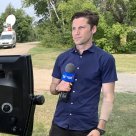Correction: This article originally stated Holly Epp said SCA members need $3 million to survive until the end of next summer. She was referring to the start of next summer.

Holly Epp, the executive director of the Saskatchewan Camps Association (SCA), told Global News the 45 member camps collectively need $3 million to survive until next year.
And that’s not counting the revenue lost this year because of the novel coronavirus.
“If we can’t run in 2021 that’s when we’re going to see… all of our camps be hit harder,” she said, speaking over Skype from Rosthern.
The provincial government didn’t allow overnight camps, which make up the majority of the SCA, to operate in 2020 because of the coronavirus pandemic.
In order to be able to do some business, several camps adapted. Many converted to day camps — which are permitted — and held sessions with a reduced amount of campers.
Blackstrap Youth Camp, located on Blackstrap Lake, about 50 kilometres south of Saskatoon, chose to hold camp online.
“Three times a week, between 45 and 60 minutes a day, kids could join, via Zoom, from their houses to do the activities the councillors had put together,” said Eric Olauson, camp vice-president and Saskatchewan Party MLA.
Olauson, who is the legislative secretary for the Ministry of Parks, Culture and Sport, told Global News that 400 campers visit the camp during an average summer.
This year they had 75 children take part in the virtual activities, which ranged from making tye-dye shirts to bonfires singalongs conducted over Zoom.
He said he considers the virtual camp a success and mentioned the camp will likely be held online again next year if there is no COVID-19 vaccine by then.
But he also said the decreased number of campers presented a challenge.
“Our revenues are down, this year over last, about 90 per cent.”
He said the camp will have to find “efficiencies” next year and that executives at the camp, which normally relies on donations, will have to find new ways to get funds and donors.
Epp said the Blackstrap example is typical of many other camps, most of which reported staffing and camper levels to be around 10 per cent of normal capacity.
She said camps will be hoping for a better summer next year after the abysmal attendance in 2020 and that camp executives are already trying to prepare — but they don’t know how.
The provincial government hasn’t said what precautions will be required for an overnight camp to be allowed to operate in the future, despite her repeatedly asking.
She also said camps would require funding in order to survive until the end of the summer next year.
“We… really need to know what those guidelines are for overnight camps in 2021… in advance, because it does take time to prep for summer,” she said, mentioning things like plexiglass barriers and cleaning supplies.
In a statement, the Ministry of Parks, Culture and Sport said it understands the impact the pandemic has had on summer camps.
“At this time, it is too early to determine all the programs or supports that may be available in the coming year for many sectors and businesses, including camps.”





Comments